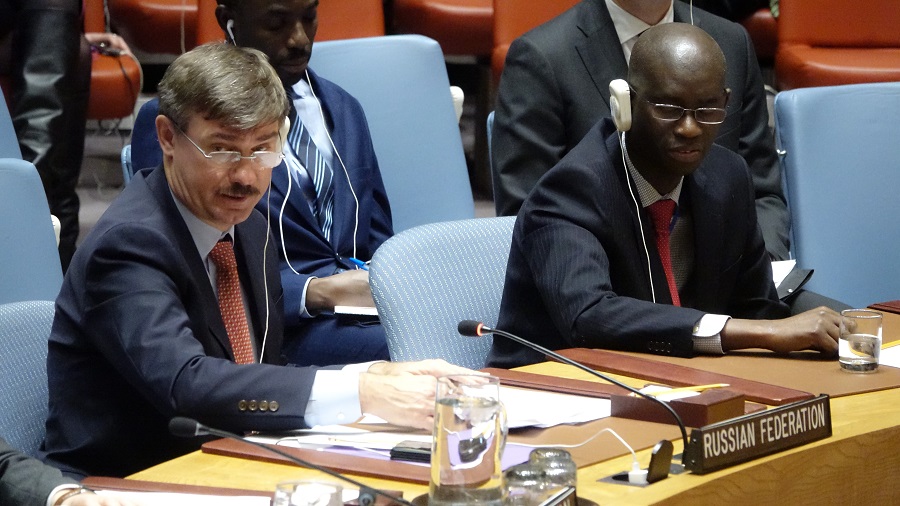Statement by Mr.Petr Illiichev, First Deputy Permanent Representative of the Russian Federation to the United Nations, at the Security Council on peacekeeping operations
We thank you, Mr. President, for organizing today’s meeting. We have found the briefing by the Assistant Secretary-General, Ms. Bintou Keita, to be quite useful.
We welcome the efforts made by the Secretary-General in the area of increasing the effectiveness of training and the capacity-building of peacekeepers. The United Nations is currently undergoing a period of large-scale transformations. One of the key areas for reform is the peace and security architecture, which is the precise context for addressing the issue of United Nations peacekeeping operations.
The ultimate goal of this process is to increase the effectiveness of peacekeeping by making sure that the Blue Helmets are adequately equipped, trained and prepared for the implementation of Security Council mandates. What is important here is not just the qualifications and professional training of the personnel, but also the possibility of the timely deployment of missions and their mobility in the field within the framework of their mandate. Unfortunately, members of the Council have not had enough time to study the report of the SecretaryGeneral. Our capitals will continue to consider it very carefully.
At the same time, we observe that the document correctly notes that the main responsibility for the issue of training, which the United Nations cannot decide on its own, lies with the States themselves, which is not just a question of the countries developing and providing training programmes but, rather, first and foremost, it is a question of the countries providing contingents in the field.
Their role cannot be overstated because without them it is not possible to implement the stated goals of the Security Council. We are convinced of the need for close triangular cooperation and coordination of efforts on the issue of training and capacity-building among the Security Council, the troop- and police-contributing countries and the United Nations Secretariat.
However, what is no less important are the direct contacts between States that are developing the training programmes and those that are participating in them. Of course, it is extremely important to take into account the contemporary realities and the demand for peacekeepers, understand what kind of peacekeepers we need today and determine the most relevant areas for training.
In this regard, we need to mention language training — an aspect that the Secretary-General has singled out as an issue in his report. We acknowledge that 48 per cent of peacekeepers work in Frenchspeaking environments, and perhaps we need to bear this in mind. However, the troop- and police-contributing countries and the host countries must together carefully weigh whether it is a priority issue. The opinions and concerns of contingent providers need to be taken into account because their troops and police officers know more than anyone what tasks are required in the field and what kind of skills are necessary to complete them.
In that context, we cannot help but notice that the Secretary-General’s report makes mention of forums whose initiators, starting in 2015, were individual Member States. Our opinion is that those issues — which are of principal importance for peacekeeping, for the United Nations system, for all Member States and for the contingent contributing countries in particular — need to be discussed at intergovernmental forums within the United Nations system.
However, creating alternative forums is no guarantee of real improvements in practice. For example, despite the efforts undertaken outside the United Nations to staff the mission in Mali, which have been ongoing over a number of years, the police component has reached only 88 per cent of the force ceiling, and the military component has only reached the even lower level of 85 per cent.
We believe that work in the area of peacekeeping should be conducted on the basis of discussions and decisions reached in the Special Committee on Peacekeeping Operations, which comprises more than 150 States members. The recommendations contained in the report of the Secretary-General, as far as we understand, lay out proposals for the organization within the Secretariat of two mechanisms designed to enhance the effectiveness of States’ interactions on training and capacitybuilding issues. We will carefully consider these initiatives.
Generally speaking, we hope that linking intra-State cooperation with the Secretariat will not create additional obstacles or provoke unnecessary competition between States that are providing training programmes. We hope that this will improve the awareness of troop- and police-contributing countries about the programmes available to them. Russian peacekeepers — men and women — are serving in 10 peacekeeping operations.
We support greater participation of women in United Nations peacekeeping. Indeed, women already represent 23 per cent of our peacekeeping units. The number of women among military observers is also increasing. Our country has gained significant experience in training peacekeepers. Russian centres train not only our peacekeepers, but also foreign peacekeepers — both police and formed units, as well as military observers.
We have designed a training system, which includes both general and specialized training, that peacekeepers undergo just before their deployment. Language training is also being adapted to existing needs. Work is under way to create additional centres to educate and train peacekeepers.
In order to broaden our contribution to the training of foreign experts for United Nations missions, we are also considering the possibility of using our General Staff Academy of the Russian Federation’s Armed Forces in the city of Naro-Fominsk. We stand ready to continue offering all possible assistance needed to strengthen the peacekeeping capacity of the United Nations as a whole.
